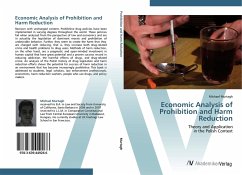After several decades of marijuana prohibition, the latter part of which has been marked by fierce debate as to the logic of invoking a criminal response to behaviour that is so prevalent and widely tolerated, the movement for reform, though unabated, has to date been largely unsuccessful in many western countries. Despite pragmatic adaptations in some legal jurisdictions to mitigate harm stemming from enforcement of the law, the goal of wider policy reform remains elusive. Theoretically informed by a constructionist approach to investigating social problems, the present study documents rhetorical dimensions of drug reform with reference to arguments presented in interviews with prominent Canadian proponents. Juxtaposing the pragmatic modern harm reduction movement with a morally invested human rights based orientation, this book argues that the latter in the long term, though neglected, is indispensible for establishing effective warrants for change. This provocative analysis ofthe new drug problem' is essential reading for a wide audience including academics, activists, practitioners, and other advocates of meaningful drug policy reform.
Bitte wählen Sie Ihr Anliegen aus.
Rechnungen
Retourenschein anfordern
Bestellstatus
Storno








